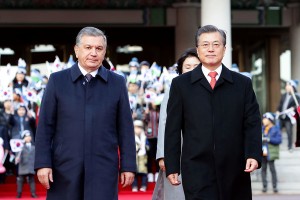 The Incheon Free Economic Zone (IFEZ) announced that a memorandum of understanding was signed on March 11 with the Namangan regional government of Uzbekistan for developments of its free economic zone. This initiative signals a new emergence in bilateral relations in which Korea and Uzbekistan show a good partnership model to the world.
The Incheon Free Economic Zone (IFEZ) announced that a memorandum of understanding was signed on March 11 with the Namangan regional government of Uzbekistan for developments of its free economic zone. This initiative signals a new emergence in bilateral relations in which Korea and Uzbekistan show a good partnership model to the world.
Along with the recent step, both sides have signed four memorandum of understanding from the last year. According to this, new investments and projects are awaiting to be completed in the near future. On the other side, Uzbekistan announced that Korea is ready to help the country’s accession to the World Trade Organization after a meeting between Paik Ji-ah, ambassador of the Korean Mission in Geneva and First Deputy Minister of Foreign Affairs of Uzbekistan Ilkhom Nematov on March 12.
Korea and Uzbekistan have a dynamic and productive relationship which covers mostly the economy, energy and cultural spheres. The countries have a totally different historical background and political past but they found a proper way for a strong partnership which implements large regional and international projects.
When we compare other cooperation attempts among countries, Korea-Uzbekistan relations include a very specific example. The countries established the diplomatic ties in 1992. As a former Soviet country, Uzbekistan didn’t have any experience in cooperation with a country that had a close relationship with the U.S. On the other side, Korea was a good model with its unique development history. Between 1992 and 2017, 16 high-level meetings were held. At this point, it is important to add other middle-level meetings took place to understand the general scope of the relations.
Uzbekistan became home to the largest Korean diaspora which is called “Goryeo-in,” or “Goryeo-saram,” around 200,000 people. These Koreans were deported to Central Asia from the Korean peninsula during the Stalin period. In the following decades, all Koreans successfully adapted to the local culture and kept important positions in society. Therefore, Uzbekistan has a special place in Korean foreign policy.
Uzbekistan has another significance with its attractive commercial potential. The country is located in a strategic geographical area which connects China and Europe. This became a motive for Korean enterprises to invest and create regional projects in the country.
During the 1990s, major Korean companies began their investments in the country and a joint cooperation committee was launched to seek new collaboration areas. Daewoo showed an essential performance in the automobile industry. On the other side, energy cooperation became a milestone in the relationship. The Korean National Energy Corporation and its Uzbek counterparts started energy exploration activities for both oil and natural gas especially in the Ustyurt area of Uzbekistan. Here, a complex worth $4 billion was built and opened in 2016.
Transportation is also an important part of the bilateral economic relations. Korean companies modernized Navoi Airport in the late 2000s which connects Uzbekistan and the world. Moreover, Korea played an effective role for the development of the Navoi Free Industrial Economic Zone. These steps made Korea the fourth largest trade partner of Uzbekistan. It is hard to imagine that two countries which are a long distance from each other established a very close cooperation and partnership. Korea and Uzbekistan have achieved this.
The former Presidents Lee Myung-bak and Park Geun-hye periods bolstered the relationship. The New Asia Initiative and Eurasia Initiative concepts of these presidents gave a private room to Uzbekistan. After having several high-level meetings, tens of agreements were signed. By 2013, trade volume had reached $2 billion along with total Korean investment worth $5 billion.
With the election of the new president, Shavkat Mirziyoyev, Uzbekistan announced that Korea was an important partner and bilateral relations should improve. His official visit to Korea in 2017 created a new atmosphere, and both sides showed their willingness to boost economic cooperation. At the same process, President Mirziyoyev declared that the upcoming year was the year of supporting active entrepreneurship, innovative ideas and technologies. Creating new advantages for investors, ensuring high economic modernization, more liberalization of the exchange market and educating skilled human resources became the main strategies of this declaration. The relationship with Korea was also mentioned as an important target.
Currently, the country hosts over 500 Korean companies and $7 billion worth of Korean investment. Samsung, LG, Lotte, Hyundai and other major companies are operating in the country for the development of new kinds of projects. This makes Uzbekistan a trade hub in the region which is the crossroads of Russia, China and U.S. investments.
Consequently, we can say that Korea-Uzbekistan relations provide a different meaning as a peaceful, win-win style of cooperation. Without any political claim, both sides concentrate on the beneficial aspects of bilateral ties. This also positively affects the regional partnerships of Korea when it comes to analyze relations with other countries. The Korean model of economic development and goodwill in the partnership has helped the Central Asian region become a new rising star in the world.
Mehmet Fatih Oztarsu – The Korea Times
Part 1: http://www.koreatimes.co.kr/www/opinion/2019/04/162_267344.html
Part 2: http://www.koreatimes.co.kr/www/opinion/2019/04/162_267351.html

 Nisan 19th, 2019
Nisan 19th, 2019  oztarsu
oztarsu  Posted in
Posted in  Tags:
Tags: 
